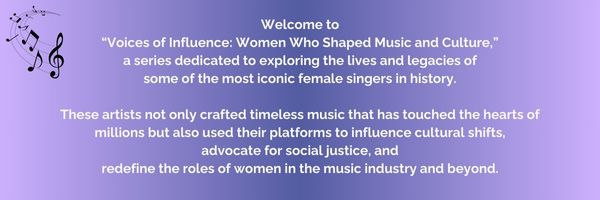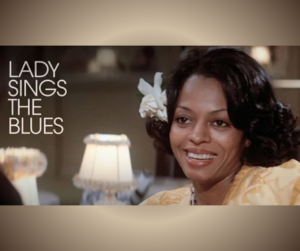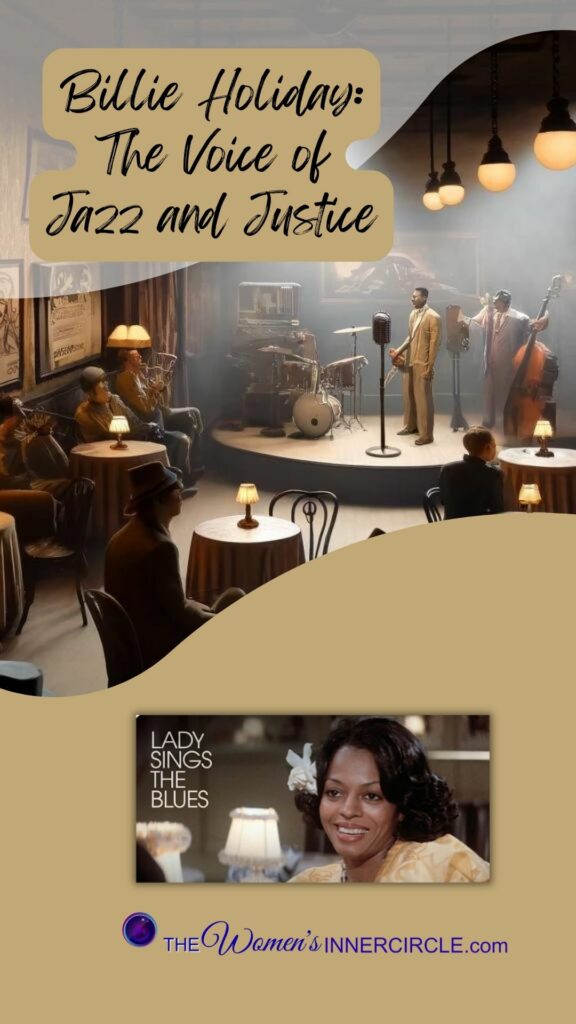Billie Holiday, also known as “Lady Day,” made significant contributions to both music and history through her unique vocal style, poignant song interpretations, and courageous stand against racial injustice. Here’s a detailed look at her impact:
Unique Vocal Style and Musical Innovation
Billie Holiday was known for her distinctive voice and innovative approach to singing. She had a limited vocal range but used it masterfully, manipulating phrasing and tempo to express emotion more effectively. Her style was heavily influenced by jazz instrumentalists, and she often approached her vocals as if she were playing a horn, incorporating a sense of swing and improvisation that was rare at the time. This technique, known as “behind the beat” singing, allowed her to stretch and compress lyrics rhythmically, giving her performances a deeply personal and emotional quality.

Influence on Jazz and Popular Music
Holiday’s influence on jazz and popular music is profound. She helped to transform the role of the vocalist in jazz, elevating the voice to a level of importance equal to that of any instrument in the ensemble. Her recordings from the 1930s and 1940s with jazz greats like Lester Young, whom she famously nicknamed “Prez,” are considered classics of the genre. Their collaborative performances showcased a perfect melding of voice and saxophone, influencing countless jazz musicians and vocalists.
Pioneering Role in Civil Rights
Billie Holiday’s role in the civil rights movement was cemented by her performances of ***”Strange Fruit,” a song protesting American racism, particularly the lynching of African Americans. Despite the risks to her career and personal safety, Holiday sang “Strange Fruit” as a declaration of protest and drew public attention to the horrors of racism. This song is often cited as one of the first overt acts of musical activism and set a precedent for later artists who used their platform to highlight social issues.
Legacy and Recognition
Billie Holiday’s legacy is enduring. She is celebrated not only for her contributions to music but also for her role in advancing civil rights. Her life and career have been the subject of numerous biographies, films, and documentaries, highlighting both her musical genius and her struggle against the personal and institutional racism she faced. Her autobiography, “Lady Sings the Blues,” though loosely factual, further cemented her status as a cultural icon. Diana Ross played Billie in the movie ‘Lady Sings the Blues,’ She was nominated for an Academy Award for her portrayal of Billie.
Challenges Overcome
Holiday’s contributions are even more remarkable considering the personal and systemic ***challenges she faced. Struggling with addiction, abusive relationships, and relentless discrimination, her ability to create such influential music under these conditions is a testament to her resilience and artistry.
Billie Holiday’s music remains a touchstone for both fans and performers, her style as emotive and powerful today as it was during her lifetime. She not only changed the face of jazz but also used her voice as a tool for change, influencing generations of musicians and activists. Her artistry and advocacy continue to resonate, underscoring her profound impact on music and history.
***A Haunting Anthem: Billie Holiday’s “Strange Fruit”
“Strange Fruit” stands as one of Billie Holiday’s most impactful and emotionally charged songs. Its history is deeply woven into the fabric of America’s struggle with racial violence. Fueled by a deep horror at the racial hatred and violence he witnessed, a Jewish schoolteacher from the Bronx named Abel Meeropol penned a poem in 1937 under the pseudonym Lewis Allan. He later adapted the poem into a song.
The lyrics of “Strange Fruit” paint a vivid picture of the lynchings of African Americans in the South. The “strange fruit” is a chilling metaphor, referring to the bodies of Black men and women hanging from trees. The imagery is stark and unsettling, deliberately chosen to evoke shock and empathy. It aimed to bring the brutal reality of racism and injustice to light.
Performance
In 1939, Billie Holiday delivered the first performance of “Strange Fruit” at Café Society, a groundbreaking integrated nightclub in New York City. The performance itself was powerful. The room would be plunged into darkness, with a single spotlight illuminating Holiday’s face. A profound silence would descend upon the audience, broken only by her voice. This dramatic setting intensified the song’s impact, leaving audiences deeply affected, often shaken.
However, singing “Strange Fruit” wasn’t without consequences for Holiday. Her record company, Columbia, refused to record the song due to its controversial nature. Despite this, or perhaps fueled by it, she recorded it with Commodore Records, a smaller label. “Strange Fruit” became one of her most celebrated recordings, even with – or perhaps because of – its grim subject matter.
“Strange Fruit” endures as a poignant reminder of America’s history of racial violence. It is widely recognized as a powerful protest song that paved the way for the Civil Rights Movement. The song exemplifies the power of art to challenge societal norms and ignite change, becoming a timeless symbol of the fight against racism.

*** A Life Marked by Song: The Challenges that Shaped Billie Holiday
Billie Holiday’s voice resonated with a depth of emotion that captivated audiences worldwide. Yet, her extraordinary talent emerged from a life marked by significant struggles. These challenges not only shaped her as a person but also infused her music with a raw vulnerability and power.
From Hardship to Haunting Melody
Holiday’s early years were a harsh introduction to the world. Born Eleanora Fagan in 1915, poverty and instability were constants. Separated from her father and with a mother often working long hours, she faced unimaginable hardships in her youth, including sexual assault and time in a reform school. These experiences cast a long shadow, influencing the melancholic undercurrents that resonated in her singing.
A Battle Within
As her career blossomed, Holiday grappled with a new kind of struggle: addiction. Drugs, initially used to cope with the emotional turmoil of her past, became a constant battle. The allure of substances was often reinforced by those around her, leading to a downward spiral that included legal trouble and a period of incarceration. This fight against addiction significantly impacted her career and well-being.
Love’s Betrayal
Love offered little solace for Holiday. Her romantic relationships were a series of disappointments, marked by exploitation and abuse. These betrayals not only caused emotional pain but also hampered her ability to manage her personal and professional life effectively.
Barriers and Burdens
As a Black artist in a segregated America, Holiday faced constant discrimination. From restricted access to basic amenities to unfair treatment in the very venues she performed in, racial prejudice was a pervasive obstacle. Additionally, the authorities, motivated by disapproval of her lifestyle and the powerful message of “Strange Fruit,” relentlessly pursued her, further jeopardizing her health and career.
A Voice That Rises Above
Despite the relentless challenges, Holiday’s music became a testament to her unwavering spirit. Her voice, imbued with the complexities of her experiences, conveyed a profound emotional truth that resonated deeply with listeners. Songs like “Strange Fruit” not only reflected her personal pain but also became anthems for those facing injustice and hardship.
Billie Holiday’s story is a powerful reminder that artistic brilliance can bloom even in the face of immense difficulty. Her legacy transcends her music, showcasing how personal struggles can fuel powerful advocacy and enduring artistic expression.

